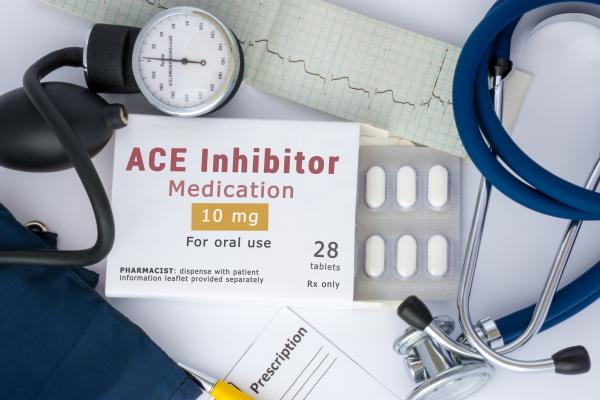
September 8, 2020 - Heart patients hospitalized with COVID-19 (SARS-CoV-2) can safely continue taking angiotensin-converting enzyme (ACE) inhibitors and angiotensin receptor blockers (ARBs), according to the BRACE CORONA trial presented in a Hot Line session at the virtual European Society of Cardiology (ESC) Congress 2020.[1]
ACE inhibitors and ARBs are commonly taken by heart patients to reduce blood pressure and to treat heart failure. There is conflicting observational evidence about the potential clinical impact of ACE inhibitors and ARBs on patients with COVID-19.[2] Select preclinical investigations have raised concerns about their safety in patients with COVID-19. Preliminary data hypothesize that renin-angiotensin-aldosterone system (RAAS) inhibitors could benefit patients with COVID-19 by decreasing acute lung damage and preventing angiotensin-II-mediated pulmonary inflammation.
Given the frequent use of these agents worldwide, randomized clinical trial evidence is urgently needed to guide the management of patients with COVID-19.
Membrane-bound angiotensin-converting enzyme 2 (ACE2) is the functional receptor for SARS-CoV-2, the virus responsible for the coronavirus disease 2019 (COVID-19).[3] ACE2 expression may increase due to up-regulation in patients using ACE inhibitors and ARBs.[4]
The BRACE CORONA trial was an academic-led, phase 4, randomized study testing two strategies: temporarily stopping the ACE inhibitor/ARB for 30 days versus continuing ACE inhibitors/ARBs in patients who were taking these medications chronically and were hospitalized with a confirmed diagnosis of COVID-19. The primary outcome was the number of days alive and out of hospital at 30 days.
Patients who were using more than three antihypertensive drugs, or sacubitril/valsartan, or who were hemodynamically unstable at presentation were excluded from the study.
The trial enrolled 659 patients from 29 sites in Brazil. All participants were chronically using an ACE inhibitor or ARB and were hospitalized with COVID-19. Patients were randomly allocated to stopping the ACE inhibitor/ARB for 30 days or continuing the ACE inhibitor/ARB.
The average number of days alive and out of hospital was 21.9 days for patients who stopped ACE inhibitors/ARBs and 22.9 days for patients who continued these medications. The average ratio of days alive and out of hospital between the suspending and continuing groups was 0.95 (95% confidence interval [CI] 0.90 to 1.01, p=0.09). The average difference between groups was -1.1 days (95% CI -2.33 to 0.17).
The proportion of patients alive and out of hospital by the end of 30 days in the suspending ACE inhibitor/ARB group was 91.8% versus 95% in the continuing group. A similar 30-day mortality rate was seen for patients who continued and suspended the ACE inhibitor/ARB (2.8% versus 2.7%, respectively with a hazard ratio of 0.97).
"This is the first randomized data assessing the role of continuing versus stopping ACE inhibitors and ARBs in patients with COVID-19," said principal investigator Professor Renato Lopes, M.D., Ph.D., of Duke Clinical Research Institute, Durham, N.C. "In patients hospitalized with COVID-19, suspending ACE inhibitors and ARBs for 30 days did not impact the number of days alive and out of hospital."
He concluded, "Because these data indicate that there is no clinical benefit from routinely interrupting these medications in hospitalized patients with mild to moderate COVID-19, they should generally be continued for those with an indication."
Funding: The BRACE CORONA trial was sponsored by the D'Or Institute for Research and Education (IDOR) and the Brazilian Clinical Research Institute (BCRI).
Disclosures: Research grants or contracts from Amgen, Bristol-Myers Squibb, GlaxoSmithKline, Medtronic, Pfizer, Sanofi-Aventis. Funding for educational activities or lectures from Pfizer. Funding for consulting or other services from Bayer, Boehringer Ingelheim, Bristol-Myers Squibb, Daiichi Sankyo, Portola.
Find more news from the ESC meeting
Related ACE and ARB Content Related to COVID-19:
ESC Council on Hypertension Says ACE-I and ARBs Do Not Increase COVID-19 Mortality
AHA Explains Severe COVID-19 is Closely Associated With Heart Issues
References:
1. ESC Abstract title: Continuing versus suspending ACE inhibitors and ARBs: Impact of adverse outcomes in hospitalized patients with COVID-19--The BRACE CORONA Trial.


 January 05, 2026
January 05, 2026 









